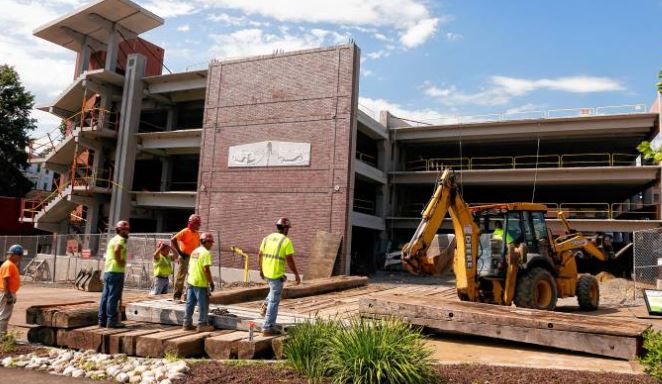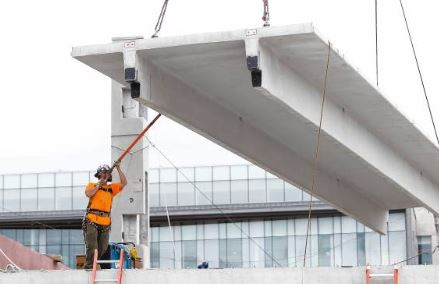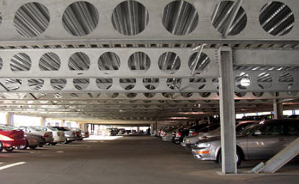Parking Garage Inspection

Commercial Parking Garage Inspection
WHAT IS REQUIRED IN THE STATE OF FLORIDA
Most states have laws to ensure safety for all structures, though requirements vary from state to state. According to Tampa, Florida ordinance 5-109.3, the building officials determine the timing and sequencing of when inspections occur and what elements are inspected at each review. Florida requires a state-licensed professional engineer to assess conditions. The state of Florida is becoming more stringent on current requirements.
In addition to providing building inspection services, Foundation Masters has extensive experience helping clients ensure that their structures stay in compliance with the entire process. This includes initial assessment through the coordination of repairs and filing all required reports according to local guidelines.
Parking Garage Inspection Checklist
Concrete Spalling in Parking Garage
Whether the parking facility is a freestanding multi-level garage or a few below-grade levels under a high-rise or plaza, proactive condition assessment and regular maintenance are critical. The harsh environments in garages, from chemicals to stress from vehicle crossing, can quickly accelerate deterioration into hazardous conditions. To prevent problems and avoid potential liability, facility managers should prioritize evaluating and maintaining parking structures to maintain structural integrity.
As a result of the importance of parking garage stability to public safety, some jurisdictions have passed legislation that requires periodic assessment and repair of parking facilities. Typically, these regulations involve a comprehensive initial evaluation, followed by periodic evaluations every few years.

Parking Garage Condition Assessment
A condition assessment beings with an initial information gathering visit, regardless of whether there is a government mandate, observed distress, or preventative efforts. The engineer will conduct a brief walk-through of the garage to review the previous problems, past repairs, and investigations. During this first phase, the objective is to determine the construction type, identify the defect and classify conditions.
Previously written reports, construction documents, records of maintenance and repairs, and manufacturing documents are beneficial. Determining the parking structure’s history, condition, and underlying construction can reduce costs by avoiding the guesswork associated with establishing the original building and past repair projects.
Assess the Condition of Parking Structure
A parking structure condition assessment begins with a comprehensive visual inspection. Cracks, concrete spalling, corrosion, delamination, condensation, displacement, and deterioration are some of the conditions the professional will examine.

An example would be a concrete garage with evidence of water or corrosion, indicating that the embedded steel connections and protective sealants have been filed. Invasive testing could be conducted to observe hidden conditions. The widespread concrete spalling and corrosion of embedded reinforcing in a concrete garage may indicate a poor concrete cover or quality that may require laboratory analysis.
Precast Concrete Garages

Members of precast concrete are cast in a factory and must be moved and assembled in the field, so there are a more significant number of joints than cast-in-place decks. When a car crosses one of these joints, the connections undergo stress reversals. As the steel connections along the joint are exhausted, the welded steel “unzips” along its length as connections fracture. As more relationships fail, the structure becomes compromised.
Cast-in-Place Garages

Garages Cast-in-place do not suffer from the connection failures associated with precast construction, but they have their own problems. Concrete is mixed in a plant and then transported to the site to cure where conditions are variable, so there is potential for error in creating a long-lasting and durable product. Concrete properties may be impacted by the transport, placement, or finishing, resulting in cracking. Concrete must be placed in forms before steel reinforcement can be installed. Not only does the reinforcement ensure structural integrity, but it also ensures durability. By not having enough concrete cover, steel can be too close to the surface, increasing corrosion potential in the presence of chloride-laden moisture. When corrosion occurs, steel expands, concrete delaminates, and eventually the concrete breaks up, known as spalling.
Steel-Framed Garages

The concrete parking decks of steel-framed parking structures are supported by structural steel members (columns, beams, or sometimes joists) in contrast to concrete parking decks (corrugated steel) or cast as confidential reinforced concrete slabs. These decks are fabricated and cast on-site, which exposes them to the same quality-control issues and degeneration mechanisms as cast-in-place decks. A metal deck component in a steel-framed garage is susceptible to deterioration by chloride-laden moisture from above as well as humidity and condensation from the air.
The corrosion of steel occurs in wet, chloride-rich environments, which are often found in coastal regions and areas where chemicals are used. A steel deck is typically coated with a galvanized coating, while structural steel is painted for protection. Over time, these coatings can become worn or compromised, allowing moisture to infiltrate and corrosion to being. Steel corrosion on exposed structural steel elements can be easily seen and evaluated. Detecting the extent of the deterioration of concealed framing or metal decking can however require invasive probes.
Conditions Assessment Report
INSPECTOR REQUIREMENTS FOR CONDUCTING CONDITIONS ASSESSMENTS:
- Professional engineers are required to perform the work,
- A license in the state of Florida is required.
- A minimum of 3 years of experience in structural engineering is required.
PROCESS OF CONDITION ASSESSMENT:
- Review of all previous Conditions Assessment Reports.
- A structural survey or as-built drawings are used to create structural base maps.
- Evaluation of structural components on-site.
- Drafting a Condition Assessment report to document compliance or deficiencies.
- Submission of required Conditions Assessment Report.
- Your local building department enforces requirements and recommendations included within the Conditions Assessment Report.
CONTENTS OF THE CONDITION ASSESSMENT REPORT:
- Structures overall physical condition.
- Dangerous/Hazardous/unsafe conditions.
- Cause and extent of deterioration.
- Conditions that must be addressed immediately to prevent an unsafe condition or structure
- Recommendations for corrective measures to be taken.
- Dangers associated with failure to address.
- Preventative maintenance recommendations.
- Future assessments.
CONDITIONS THAT MAY BE UNSAFE INCLUDE:
- Rebar that has been exposed.
- Significant deflection.
- Spalling concrete falling from the support.
- Steel corrosion.
- Fractures or cracking.
- Water intrusion.
- Concerns are not readily apparent to the naked eye.
LET US HELP!
Deficiencies or distress can create unsafe conditions. By routinely evaluating parking structures, building owners and facility managers can save time and resources by identifying and treating conditions before they become pervasive and require costly and disruptive remediation.
The Foundation Masters team has extensive experience assisting clients with all aspects of parking garage inspections. Helping to ensure that owners remain compliant with Florida’s safety requirements. The scope of our services includes the exam itself, all follow-up work, including preparing contracts for repairs, assisting in bidding and negotiating with qualified contractors, and construction phase support.
For further information or to arrange an inspection, please get in touch with our office at 813-614-1718 or via email jeff@foundationmasters.com
